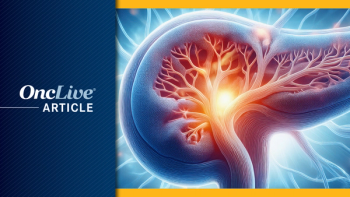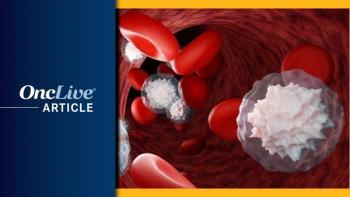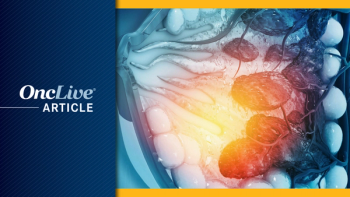
Vecabrutinib Shows Evidence of Stable Disease in High-Risk B-Cell Malignancies

John N. Allan, MD, discusses the study results of a phase 1b/2 dose-escalation trial with vecabrutinib in patients with B-cell malignancies.
John N. Allan, MD
Patients with high-risk, relapsed/refractory B-cell malignancies experienced stable disease and mild adverse events (AEs) with the reversible noncovalent BTK inhibitor vecabrutinib, according to data from a phase 1b/2 dose-escalation trial (NCT03037645).
Among the 29 patients in the trial, 7 experienced stable disease. Among 5 patients who escalated to 300 mg of vecabrutinib in cohort 5, 3 of them experienced stable disease.
Eligible patients had received ≥2 prior lines of therapy and progressed on a covalent BTK inhibitor. In the phase 1b portion of the trial, patients started at 25 mg of vecabrutinib (cohort 1) and escalated to 500 mg (cohort 7).
Patients received a median of 4 prior lines of therapy, and the majority of patients had ≥1 high-risk feature. At screening, 78% of patients had mutated or deleted TP53, 61% had BTK C481 mutations, and 13% had PLCG2 mutations (n = 5). Twenty-three of the patients had chronic lymphocytic leukemia (CLL).
At the time of data cutoff, patients had been treated with up to 400 mg of vecabrutinib, with no dose-limiting toxicities (DLTs). The most common all-grade treatment-emergent AEs (TEAEs) were anemia (35%), headache (28%), and night sweats (24%). Notably, there were no grade 3/4 TEAEs in cohorts exceeding 50 mg.
"It's early still, but we’re seeing some encouraging signs of activity. We are encouraged by the safety profile of the drug, which is allowing us to [raise] the dose. [The hope is that we'll be able to define] a dose that is effective in this very high-risk patient population," said lead study author John N. Allan, MD.
In an interview with OncLive, Allan, assistant attending physician at NewYork-Presbyterian Hospital and assistant professor of medicine, Weill Cornell Medical College, discussed the study results with vecabrutinib in patients with B-cell malignancies.
OncLive: Could you provide the rationale for the trial?
Allan: This is a first-in-human clinical trial looking at the reversible BTK inhibitor vecabrutinib in patients with B-cell malignancies. Reversible inhibitors [could] be active in BTK-mutated lymphomas, so we tested the drug in patients who were resistant to BTK inhibitors.
What is unique about vecabrutinib?
Vecabrutinib is [part of a class of agents] being tested in patients with B-cell malignancies. These drugs are unique from FDA-approved BTK inhibitors in that they are reversible. The currently FDA-approved agents are covalently bound to BTK, irreversibly inhibit the enzyme, and shut down B-cell receptor signaling that funnels through BTK.
Frequently though, when patients with B-cell malignancies, such as chronic lymphocytic leukemia (CLL), mantle cell lymphoma (MCL), and Waldenström macroglobulinemia (WM) progress on those drugs, they develop a mutation that renders the drug ineffective.
The reversible inhibitors have an ability to overcome that [resistance], reestablish inhibition of the BTK protein, and therefore shutdown the B-cell receptor signaling pathway.
How is the trial designed?
We're looking at patients who have been previously exposed to and progressed on a BTK inhibitor. [To be eligible, patients had to have], prior exposure [to a BTK inhibitor], have received ≥2 lines of prior therapy, and progressed on the drug. [Patients with BTK] intolerance were not eligible for this study.
We looked at a wide range of histologies, including CLL, WM, and marginal zone lymphoma, as well as other B-cell malignancies, such as diffuse large B-cell lymphoma and follicular lymphoma —if there was no standard of care and a BTK inhibitor was considered a potential option.
To date, we’ve enrolled 29 patients. We reported data on those patients at the 2019 ASH Annual Meeting.
What did the results show?
As in all phase I studies, we’re trying to establish the maximum-tolerated dose (MTD) and identify any potentially DLTs. We continue to go through our cohorts to identify those safe doses.
To date, we have not seen objective responses, but these patients have extraordinarily high-risk genetic features. These patients are refractory to pretty much all known therapies and are a very sick patient population.
We are currently in cohort 5. We're planning to test doses all the way up to cohort 7 at a dose of 500 mg twice daily. We reported results from cohort 5, in which patients received 300 mg twice daily, and while we’re not seeing responses as of yet, we saw some good signals for disease stability. Additionally, some patients had lymph node reduction.
What's most important is that we're showing that the drug is very safe. There are no new safety signals that are coming out. We're seeing many [AEs] that are associated with BTK inhibitors, but at low rates. Importantly, we have not seen some of the most [common] toxicities, such as atrial fibrillation [with the doses we have tested].
What were some of these high-risk features?
Close to 80% of patients have unmutated IGHV; close to 78% of patients in the study have p53 mutations. Another 60% of patients have a 17p deletion. Importantly, 61% of patients have BTK mutations. Additionally, another 41% of these patients have seen venetoclax (Venclexta). [These patients have progressed on] some of the most effective therapies we have.
What are the next steps for this research?
We are looking to identify the MTD and the recommended phase II dose. Once we identify the [recommended phase II dose], we'll expand the study to other sites and other cohorts and start testing the drug in a broader patient population, rather than such a refractory patient population.
How might we distinguish between BTK inhibitors if these reversible BTK inhibitors become available?
It's a good question and tough question. I don’t know if I have an absolute answer. We never want to sacrifice the efficacy of a drug, so if we can prove a drug is equally effective as established agents, we would want to look at the safety profile of that drug. If we can identify a similarly effective drug that has less AEs, [is as safe as the established drug], or prevent disease relapse due to a certain mutation, it may start to have an advantage over other established drugs, leading to its uptake.
Is there anything else you would like to emphasize about the trial?
We still have a lot to learn about these reversible inhibitors in terms of how they work and how they can overcome BTK mutations, as well as downstream mutations such as PLCG2. [All reversible BTK inhibitors] have different properties, so there's still a lot to be learned about each molecule in this drug class, how effective they might be, and what role they may play.
Allan JN, Patel K, Mato A, et al. Ongoing results of a phase 1b/2 dose-escalation and cohort-expansion study of the selective, noncovalent, reversible Bruton’s tyrosine kinase inhibitor, vecabrutinib, in B-cell malignancies. Blood. 2019;134(suppl_1; abstr 3041). doi:10.1182/blood-2019-126286

























































































